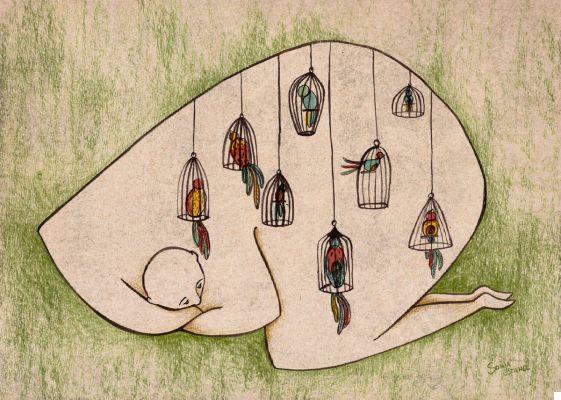
In an increasingly narcissistic and self-centered society, liquid relationships threaten to become the new standard, a standard of fragile bonds that enhances the tendency to flee when things go wrong. In that environment, emotional responsibility is rare. However, if we are to establish mature, fulfilling, and satisfying relationships, we must develop emotional responsibility.
What is emotional responsibility?
Affective responsibility is the full awareness of the impact our words and actions have on others. It involves being aware that our behaviors have consequences on the emotions of others, whether they are positive or negative.
Therefore, this concept leads us to conceive the relationships we establish as spaces in which each is influenced by the actions and decisions of the other. This leads us to a more respectful and empathetic relationship model with what others may feel, instead of ignoring how we affect those around us.
The concept of emotional responsibility does not imply adapting to others or constantly putting their needs before ours, but only striving to build more equitable, respectful and transparent relationships, based on the awareness that we all have the ability to generate emotions in others, as well as others , they can generate emotions in us.
This awareness is what allows us to communicate assertively, respecting the other, and to develop the maturity necessary to assume our responsibilities and correct our mistakes.
The huge difference between emotional responsibility and psychological projection
Affective responsibility is the antithesis of psychological projection. When we project we think in terms of "you are responsible for how I feel" or "I am responsible for how you feel". Consequently, this generates feelings of guilt, unhealthy attachment, emotional dependence and controlling behaviors.
Psychological projection is a double-edged sword. We can use it to blame ourselves for the emotions of others or to blame others for how we feel.
When we think in terms of psychological projection, we tend to take responsibility for how others feel, to the point where we think our mission is to make them happy and relieve their pain. On the other hand, when we think in terms of emotional responsibility, we worry about the happiness of the other and try to alleviate his suffering as much as possible, but we are aware that this weight does not fall completely on our shoulders.
We can also make the mistake of projecting our feelings onto others, holding them accountable for our emotions. So we end up putting on their shoulders the responsibility to make us happy and we blame them for our misfortunes. On the other hand, if we are emotionally responsible, we understand the influence others have on us, but we realize we have the power to change those feelings. So let's remove the guilt from the equation.
We cannot control the circumstances, but we can manage our emotions
Philosopher Aaron Ben-Zeev explained that many times the spontaneous nature of emotions makes us believe that we are not responsible for them. But the truth is, we have power over our emotional reactions and we can use it to improve our relationships with others and with ourselves.
Negative emotions are inevitable, but we can know when we experience them and observe how they affect the people we interact with. Not being aware of the damage we cause doesn't erase it. We can also understand how others affect our emotional states.
This implies accepting to live certain situations that can generate unpleasant emotions, so that instead of dedicating ourselves to finding guilty or complaining, we need to project ourselves into the future and ask ourselves what we can do to change the situation. How can we respond more assertively? What can we do to mitigate the damage? It is about developing a proactive approach.
Ultimately, we have the power to decide what responsibilities we want to take on. We should avoid "it's not my problem" ideas when we can actually help and the "I absolutely have to do something" mentality when we can't help.
Affective responsibility is not just about one part
Since emotional responsibility involves understanding each other's influence, it requires commitment from both sides. When faced with a difficult or conflicting situation, it is essential to reach agreements in which each party assumes its responsibilities.
For this, it is essential to establish assertive communication. We need to be able to express how we feel, what we want, what bothers us, as well as our expectations and ideas. Speaking clearly about our feelings creates deep emotional bonds and builds bridges to resolve conflicts.
This assertive communication focused on the creation of agreements must be transparent, but always taking into account the opinions and wishes of the other. We need to understand that a relationship is made up of more than one person, which may seem like truism, but it would actually avoid a lot of conflict. We need to remember that we are not the only ones living on earth and starting to be more empathetic by putting ourselves in each other's shoes.
Of course, emotional responsibility does not imply acting perfectly, which is impossible. Rather, it is about acting with empathy and respect, resorting to dialogue, reflecting before speaking or acting and taking the consequences of our emotional reactions.
It is not a miracle cure for pain and interpersonal conflict. The possibility of hurting others or being hurt is always latent. Even tensions will not go away as if by magic.
Affective responsibility simply helps us stop dealing with problems by taking the blame or blaming it. Responsibility arises in place of guilt, so that conflicts become an opportunity to get closer and better understand ourselves, from a more sensitive position.


























